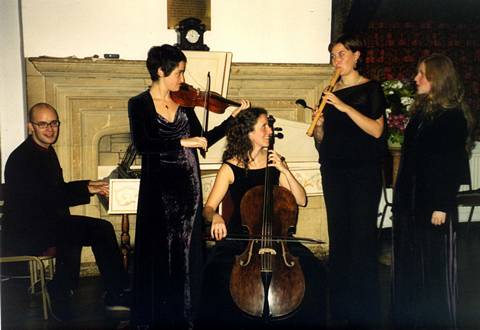|
<< -- 3 -- Rex Harley MUTUAL ENTHUSIASM

Their performance space is the upper room. On one long wall is an imposing fireplace,
and the chairs are arranged in three, shallow curving rows facing it. Gradually, the
room fills, and by the time the musicians make their entrance, nearly all the chairs
are occupied. This is, in itself, a positive start because, in the nature of these things,
no-one could predict in advance if they'd be playing to fifty people, or only five.
Their theme for the evening is 'The Italian Job', and the music spans two hundred and
fifty years, from the late sixteenth to the mid-eighteenth century. There are the
well-known composers -- Monteverdi, Frescobaldi and Vivaldi -- and more obscure, such as
Rossi, Caccini, Albertino and Castello.

Phoenix Rising. From the left: Joakim Olsson Kruse, harpsichord; Emma Alter, violin; Ingrid Viñals, baroque cello; Sarah Saunders, recorder and baroque oboe; Sophia Brumfitt, guest vocalist
|
The first, Monteverdi's La Musica gets things off to a rousing start. Sitting so
close to the musicians, one can observe not only the handling of their instruments but
every nuance of facial expression, and when they are enthusiastically applauded it is
touching to see the genuine delight in their small side-ways glances to each other.
Thus encouraged, they relax into their programme, which has been carefully chosen to
show their ensemble playing and also to highlight their individual talents. So we are
able to appreciate the flexibility and dexterity, the lightness of touch of Sarah's
recorder playing; the nimble, bright flourishes of Joakim's harpsichord, and his subtle
accompanying; Emma's beautifully rich violin tone, and an almost gypsy earthiness in
places; and Ingrid's totally firm, precise cello. As they leave the stage the applause
follows them and does not end till they are well out of sight downstairs.
The second half begins with a chance to hear Sarah's other instrument --
the Baroque oboe -- in the Sonata for Oboe and obligato cello by the little-known
Giovanni Platti. What most of the audience do not know is that Sarah has been grappling
with a troublesome reed. Bearing in mind that that the baroque oboe is a difficult animal
to control at the best of times, this is rather like watching a tight-rope walker perform
without a safety net and blindfolded. And, similarly, when she pulls it off with
great skill, it's even more impressive to those who were aware of the double difficulty
of the task. There is a peculiarly haunting quality to the sound, and the rapport between
oboist and cellist testifies to the time they have spent working together. Which takes us
to Vivaldi's famous version of La Folia, thrillingly played, and giving us all
the chance to appreciate Ingrid's formidable technique -- accuracy and intonation
perfectly unscathed, even in the fastest passages.
Continue >>
Copyright © 8 November 2003
Rex Harley, Cardiff UK

|

